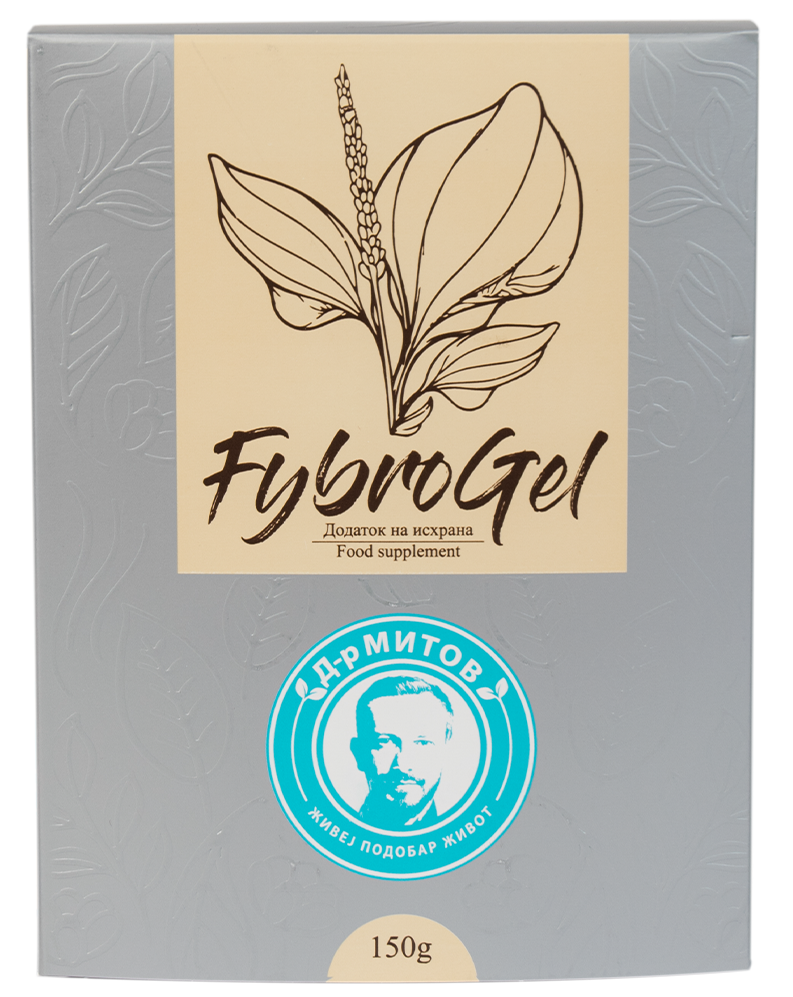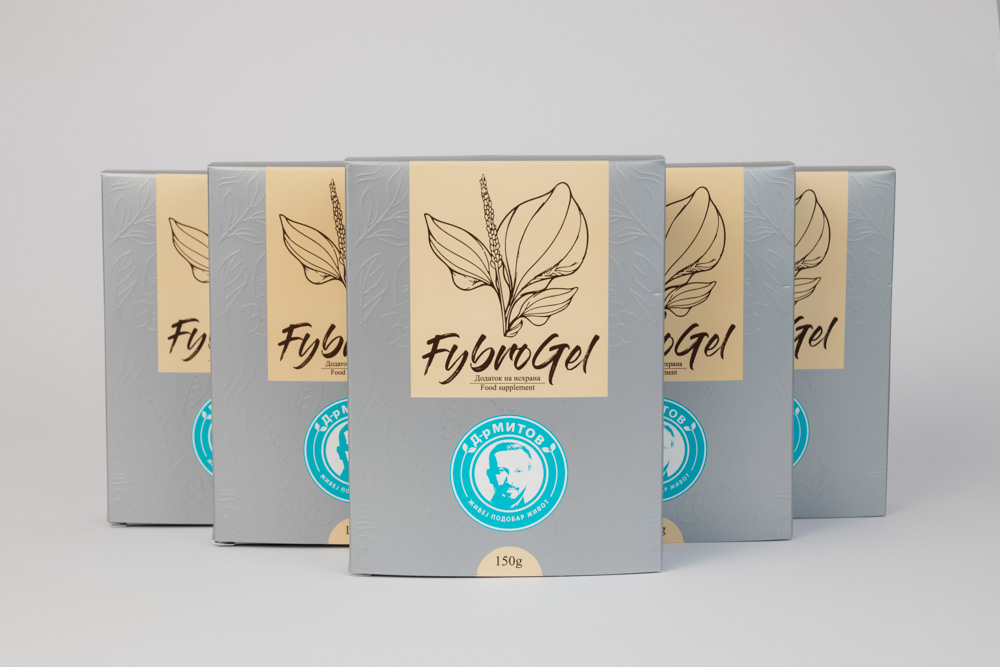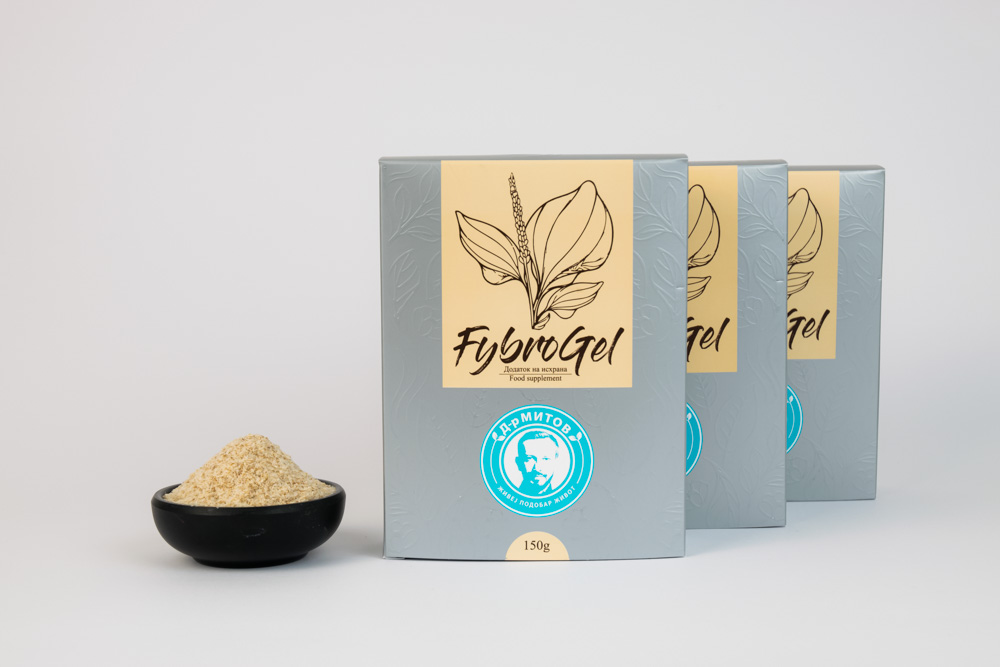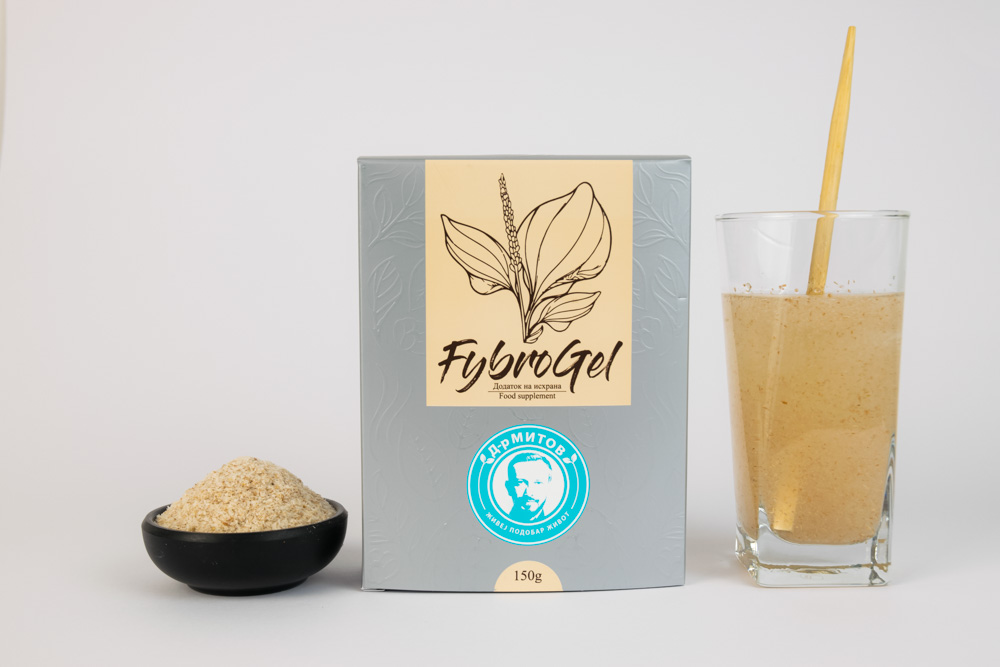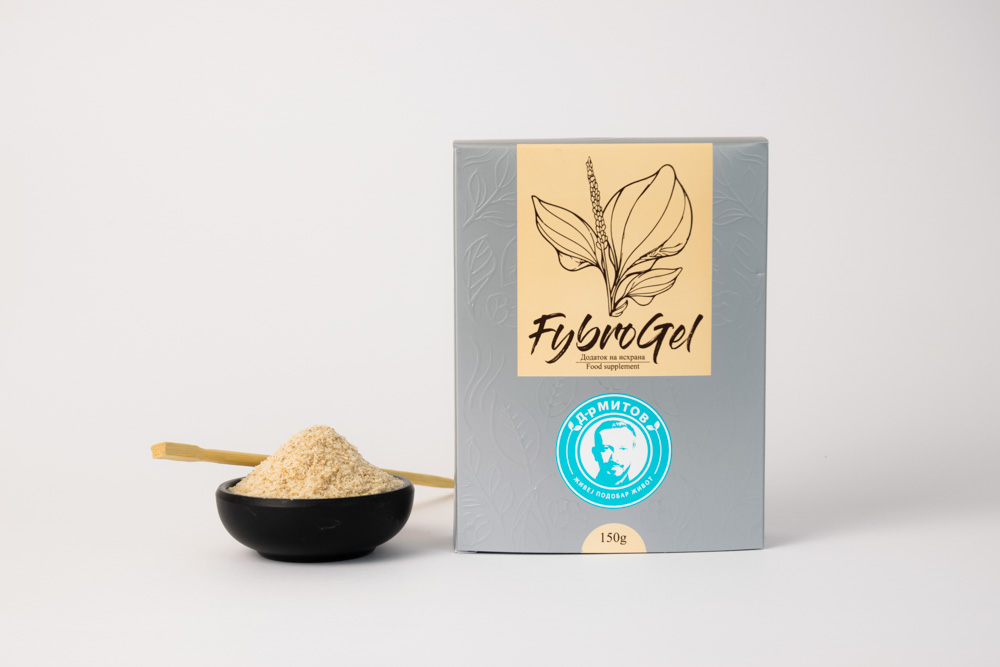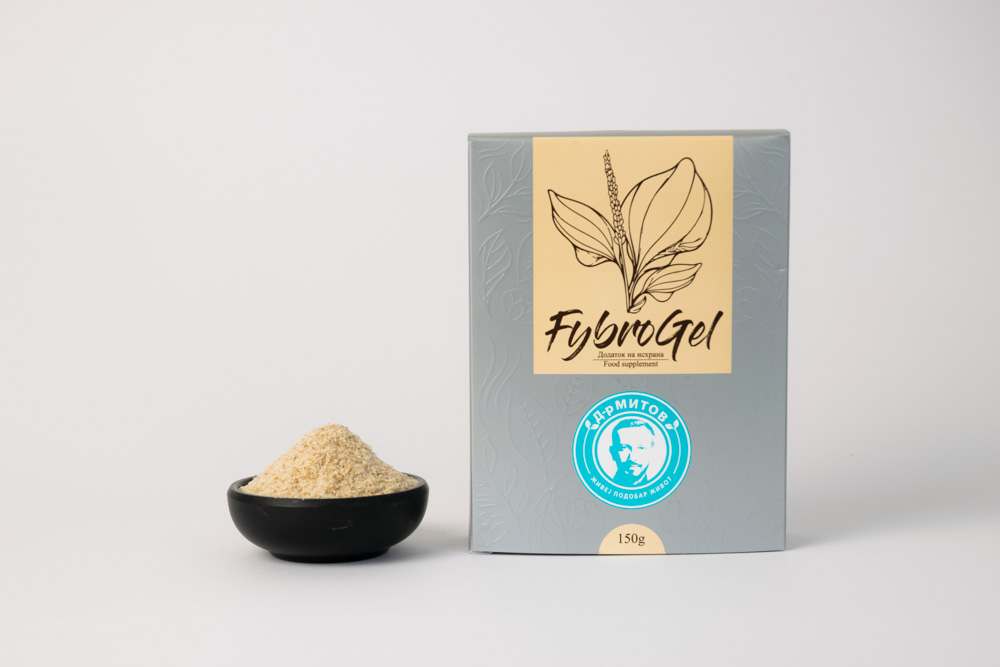FYBROGEL
FYBROGEL is a natural laxative and it contributes to a healthy and regular emptying of the intestines. Its mechanism of action is by increasing the VOLUME of feces.

A question I get frequently asked is: What is a common nutritional deficiency?
Although you might think you can easily guess the answer, you would probably be wrong. One of the most common and typically unnoticed deficiencies of the so-called "western" or "modern" diet is in fact, fiber.
The statistics are undisputable, only 5% of the American population meets their fiber needs. Because of the similar habits, the situation is quite similar in Western Europe and in Macedonia.
Fiber requirements range from 25g for women to 38g for men.
The deficiency of fiber is directly related to a series of health problems: chronic constipation and irregular bowel movements, various digestive problems, increased body weight, less diversity of the microbiome - conditions that directly affect our overall health.


The solution seems simple – increased fiber intake through diet
However, practice shows that the modern lifestyle often does not allow sufficient fiber intake. Thus, supplementation with fiber is imposed as an essential part of the solution. And when it comes to supplements - the best choice is psyllium or FYBROGEL.
We are talking about water-soluble fibers. FYBROGEL is a natural product, it is actually a husk from the seeds of the Plantago ovata plant. There are many names in the world for these fibers, including: ispaghula, psyllium, isabgol and others. Basically, FYBROGEL consists of natural plant fibers, which is why we say it is a PREBIOTIC and is a substance needed for the natural growth and development of the beneficial bacteria (PROBIOTICS) in our intestines.
Proven and potential effects of using FYBROGEL:
Natural bowel cleansing and better digestive health
Softer stool
Better management and treatment of hemorrhoids
Natural supplement - intake of fiber

Natural treatment and improved cholesterol regulation and better heart health
Optimized sugar regulation
Aid in weight loss
Natural bowel cleansing and better digestive health
FYBROGEL is a natural laxative, meaning it contributes to healthy and regular emptying of the intestines. Its mechanism of action is by creating larger VOLUME of the excrement. So, the acceleration of peristalsis is not based on intestinal irritation or stimulation, but rather on the basis of increased volume and softness of the feces. That is why FYBROGEL is not addictive, like other laxatives, but it simply helps move the feces easier through the intestines.
Fiber improves digestive health - it improves intestinal peristalsis, it reduces the risk of the most common digestive diseases - diarrhea, constipation, disorders related to the beneficial intestinal microbiome, inflammation (irritable bowel syndrome, gastritis), etc.


Softer stool - significant help with hemorrhoids
FYBROGEL contributes to the formation of soft stool and helps in all conditions where it is needed, such as the case with hemorrhoids.
Natural help for cholesterol regulation and better heart health
In addition to the effects of peristalsis, FYBROGEL contributes to better cholesterol control. Namely, when fiber moves in the intestines, it has the capacity to bind cholesterol and take it out of the body with the feces.
Adequate fiber intake is associated with a reduced risk of cardiovascular disease in serious studies with a large number of subjects followed for years. One such study, from Harvard University, USA, followed over 40,000 male health professionals, and found that those who had the highest fiber intake through their diet,had a reduced risk of heart disease by as much as 40%. Another study, with female respondents, shows quite similar results and conclusions.
The reasons for the drastically reduced risk go in several directions: fiber can lower blood cholesterol and triglyceride levels, it helps regulate blood sugar, helps lower blood pressure, and prevents metabolic syndrome and last but not least – it can reduce chronic inflammation.
For example, studies show that psyllium can lower blood cholesterol by binding to fats and bile acids in the intestines, making the body expel them more efficiently and quickly. As the body compensates for lost bile acids, the liver uses up cholesterol. The results are logical and clear - cholesterol levels in the blood decrease. In addition, fat levels (triglycerides) also decrease, and the levels of "good" LDL cholesterol increase.
All the mentioned factors largely determine and influence our cardiovascular health.



Optimized sugar regulation
Fiber interferes with the work of digestive enzymes, which in turn, slows down digestion and thus avoids sugar peaks and then sudden drops that are actually quite risky for our health (especially for diabetics) and leave us constantly feeling hungry. By doing so, fiber helps lower the glycemic index of foods and also increase satiety levels after a meal - helping maintain sugar levels, but also help keep a healthy weight. This explains why fiber is considered one of the most important parts of any diet that aims to regulate blood sugar levels.
Aids in weight loss
Apart from regulating glucose ( ensuring its gradual absorption into the bloodstream), fiber acts on satiety and by binding excess water in the stomach, encourages a feeling of a full stomach.
By reducing the risk of obesity, fiber contributes to reducing all the risks that go hand in hand with excess body weight.

Symptoms of fiber deficiency?
Although deficiency symptoms are not always completely clear and can be distinguished as such, there are 6 signs that can strongly indicate a fiber deficiency:
- Recurring constipation
- Increased body weight
- High cholesterol
- Increased chronic inflammation
- Strong changes in blood glucose levels
- Fatigue, lack of energy, nausea and a general feeling of weakness
The daily recommended fiber intake is: about 38g for men and about 25g for women. For older men, the recommendation is about 30g, and for older women - about 20g.
Dosage:
To speed up peristalsis, it is recommended to take one teaspoon in a large glass of water after a meal, up to three times a day. When a good and regular bowel movement is established - the maintenance dose is one teaspoon per day.
It is recommended not to leave the husk for a longer period in the glass of water, since fiber are known for water absorption and creating a form of gel - hence the name, Fybrogel. So, a teaspoon of Fybrogel is added to a large glass of water, stirred and is quickly drunk.
The effect is visible within 24-42 hours of taking the first dose.
Regarding weight loss: it is taken 15 minutes before the first two meals of the day, in the same way.


FIBROGEL - NUTRITIONAL VALUE:
Nutritional value per 100g/Nutrition facts per 100g:
- Energy 200kcal / 837kJ
- Protein 4.6g
- Fat 0.5g
- Saturated fat / Saturated fat 0.06g
- Carbohydrates / Carbohydrate 75.3g
- Fiber 77.3g
- Salt / Salt 0g
100g CONTAIN: 75.3g OF FIBER
Useful links and scientific research
The effects of psyllium on lipoproteins in type II diabetic patients
Lipid- and glucose-lowering efficacy of Plantago Psyllium in type II diabetes
Effects of psyllium on metabolic syndrome risk factors
Therapeutic effects of psyllium in type 2 diabetic patients
Lipid- and glucose-lowering efficacy of Plantago Psyllium in type II diabetes
Effect of method of administration of psyllium on glycemic response and carbohydrate digestibility
Lipid- and glucose-lowering efficacy of Plantago Psyllium in type II diabetes
Psyllium decreased serum glucose and glycosylated hemoglobin significantly in diabetic outpatients
Dietary fibres, fibre analogues, and glucose tolerance: importance of viscosity
Testing control of radiation-induced diarrhea with a psyllium bulking agent: a pilot study
Psyllium is superior to docusate sodium for treatment of chronic constipation
An unfermented gel component of psyllium seed husk promotes laxation as a lubricant in humans
The effects of a supplement of dietary fibre on faecal excretion by human subjects
Digestibility and bulking effect of ispaghula husks in healthy humans
Bulk laxative efficacy of a psyllium seed hydrocolloid and of a mixture of cellulose and pectin
Beneficial health properties of psyllium and approaches to improve its functionalities


